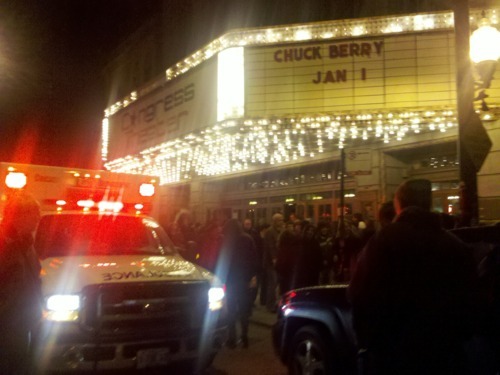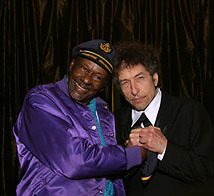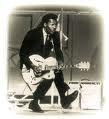Chuck Berry: American Poet

Congress Theater, Chicago, Jan. 1, 2011 (Photo by Diane Soubly)
Jan. 4, 2011— One moment was lost in the storm of Chuck Berry’s collapse during his New Year’s night concert at the Congress Theater in Chicago.
About halfway through the show a thin and somewhat wobbly Berry approached the front of the stage of the dank 85-year-old theater. Berry stood alone. He did not know his band. He hadn’t been to Chicago in years. He was out of the shadows.
Berry began to recite a prose poem about winter. It was difficult to decipher all the words from my perch in the steamy first balcony. I’ve seen Berry several times, including his home base of the Duck Room at Blueberry Hill in St. Louis, but I have never heard him read poetry. The moment had the bittersweet nature of Shakespeare’s King Lear.
Here was Berry, like King Lear, shadow boxing destiny and searching for empathy in the winter of his life.
Berry apologized to Chicago fans at the end of the night. He also apologized to fans at B.B. King’s in New York, according to reports on Rolling Stone.com. This is unlike the cantankerous Berry profiled in books and snippets of the 1987 Taylor Hackford documentary “Hail! Hail! Rock n’ Roll.”
Were you there the night the audacious, bold, crazy and moody Chuck Berry asked for forgiveness?
I have always ranked Berry with Frederick Seidel, Bob Dylan and Langston Hughes as the greatest 20th Century American poets. Berry wrote with economical, playful rhythms that blew like streamers out of America’s post-World War II boom of airplane, car and television culture.

I told him this face-to-face last January during a rare backstage interview at Blueberry Hill in St. Louis. Berry answered in clear meters.
With straight-ahead eyes that twinkled in the twilight, Berry said, “Diction is respect. I learned that from Nat King Cole and Louis Jordan. Even if you can’t hear the beat, the words will get you where you want. Its like poetry.” (Full story here under the MUSIC category).
After the Congress show, Blueberry Hill owner/Berry confidant Joe Edwards told me that Berry had a couple of “spoken word” pieces for his highly anticpated album that has been in the works for seven years.
Berry closes out the end of his 1987 “Chuck Berry: The Autobiography” [Harmony Books] with three pages of poems. And, in a precious extra of the “Hail! Hail! Rock n’ Roll” DVD package Berry recites “Even This Too Shall Pass,” the tender 1904 poem by newspaper editor-abolitionist Theodre Tilton. He died three years after writing the poem.
In footage not used in the theatrical release, Berry’s reading is accompanied by Robbie Robertson thumb picking on acoustic guitar. The footage was shot in Robertson’s Los Angeles home which Berry playfully observed was on “the only circular acre lot in L.A.”

Taking only a bit of liberty with the original words, Chuck Berry recites:
“Standing in the public square, thirteen meters in the air
Rose his statue carved in stone, as the king stood there unknown
Gazing at his sculptured name, he said to himself, so what is fame?
Fame is but a slow decay; even that will pass away.
And then…..
“Struck with cancer, sore and old; lying at the Gates of Gold
Speak he with his dying breath, life is gone, so what is death?
Then, in answer to the king (here Berry drops his head while Robertson plays)
Fell a sun beam on his ring… even I shall pass away.”
(It should be noted Tilton’s original poem ended with “…even this shall pass away.”)
Berry tells Robertson how, musically he always felt the mood of his lyrics. And that “two words with four syllables, you gotta’ say them (eight) to the bar.” That’s rock n’ roll.
Chuck Berry is the king of rock and roll.
And deeper than people will ever know.


Leave a Response